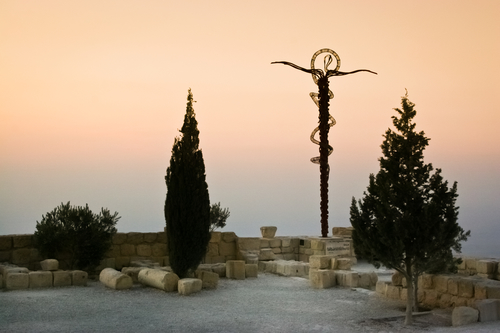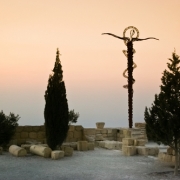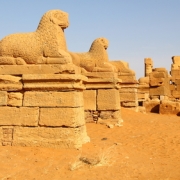Hear and Do
/2 Comments/in Weekly Devotional/by David GuzikBecause they did not obey the voice of the LORD their God, but transgressed His covenant and all that Moses the servant of the LORD had commanded; and they would neither hear nor do them. (2 Kings 18:12)
We don’t know the exact human author of the books of 1 and 2 Kings. However, we do see that in this verse, the human author wanted us to understand why the northern kingdom of Israel – the kingdom of the ten northern tribes – was conquered by the cruel Assyrian Empire.

Simply said, it was because they did not obey the voice of the LORD. Yahweh was the covenant God of Israel, but Israel transgressed His covenant and they broke the laws given through Moses the servant of the LORD.
These are all themes we have seen before in 2 Kings. What catches my attention in this verse is the line, they would neither hear nor do them. Their disobedience and ultimate destruction were connected to their refusing to hear the word of God and to do the word of God.
First, we hear God’s word. We hear it proclaimed in preaching and Bible studies. We hear it by reading the Bible aloud. We hear it by singing the Bible. We hear it in our minds as we read the Bible.
But we don’t stop at hearing; we then must do God’s word. We do it by repenting and believing. We do it by worshipping God. We do it by much prayer. We do it by the hard work of Christian community. We do it by reaching a lost and broken world.
The command to not only be hearers, but also doers of God’s word, comes to us again in the New Testament (James 1:22). It reminds us that we must receive God’s word as those who do, not only as those who hear.
Jesus used this same point to conclude His great Sermon on the Mount. He said that the one who heard the word without doing it was like a man who built his house on the sand, but the one who heard God’s word and did it was like a man whose house was built on a rock and could withstand the inevitable storms of life and eternity (Matthew 7:24-27).
In many churches there are hearers who admire; hearers who love to hear, hearers who are devoted – yet all the time they are unblessed hearers, because they are not doers of the word.
Remember that by blood, the people of the Northern Kingdom were not any less Israelites and descendants of Abraham than were the people of the Southern Kingdom. Therefore, this clearly showed Judah that when they also stopped to hear and to do the word of God, they would also face judgment.
Put your attention on God and His great truth – hear. Then, relying on the power and wisdom of the Holy Spirit, set yourself to do His will as revealed in His word.
Never Taken Back
/1 Comment/in For Pastors, Preachers, Bible Teachers/by David GuzikDear Pastor, Preacher, or Bible Teacher –
First, let me apologize for failing to send these encouragements over the last few months. A busy travel schedule partnered with procrastination, and so it has been a while.
Having said that, how was your weekend? If God gave you the opportunity to preach or teach His Word, I pray that it was effective and that you were able to enjoy being God’s messenger.
Here is a familiar verse from Romans 11:
For the gifts and the calling
of God are irrevocable.
(Romans 11:29)
Today I want to encourage you with that brief line from Romans 11:29: the gifts and the calling of God are irrevocable. In the context of Romans 11, the Apostle Paul had in mind God’s faithfulness to Israel; that God had not given up on them or taken away any of the gifts or calling He had given to them.

However, I don’t think it is wrong to say that this reflects an important aspect of God’s character, His nature. God acted this way toward Israel because that is the kind of God He is. Therefore, that is how God is toward us today.
Rest in that truth: the gifts and the calling of God are irrevocable.
“I really preached a poor message last Sunday.” That might be true; but the gifts and the calling of God are irrevocable.
“I am in a strange season where I feel put on the shelf, and my gifts are not being used.” Maybe that is true; maybe not. But, the gifts and the calling of God are irrevocable.
“When I compare myself to others, I feel like a loser.” Perhaps you feel that way; but the gifts and the calling of God are irrevocable.
“My struggles with sin and personal character disqualify me from ministry right now.” We hurt with you; but remember that the gifts and the calling of God are irrevocable. As your character grows in Christ, over time there may be new ways that God’s gifts and His calling on your life are used for His kingdom. Don’t despair.
As I said before, the original context for Romans 11:29 regards Israel. But if God was that faithful to Israel under the old covenant, will He be less faithful to you under His new covenant, a greater covenant?
Finally, if you had a great Sunday and are in a great season of ministry – praise the Lord! But remember, it’s really because of His gifts to you and God’s calling on your life. The credit, the honor, the glory of it all – goes to Him, and to us.
Blessings to You in Jesus’ Name – David Guzik
Click Here to Receive Email from David for Pastors, Preachers, and Bible Teachers
A Great King
/0 Comments/in Weekly Devotional/by David GuzikHe trusted in the LORD God of Israel, so that after him was none like him among all the kings of Judah, nor who were before him. For he held fast to the LORD; he did not depart from following Him, but kept His commandments, which the LORD had commanded Moses. (2 Kings 18:5-6)
The Kingdom of Judah – from the two southern tribes of the twelve tribes of Israel – had more than 15 kings over almost 350 years. The king described in 2 Kings 18 was special, and his name was Hezekiah. Look at all the things that made him a great king:

He trusted in the LORD God of Israel: The first thing said about Hezekiah’s relationship with the LORD was that he trusted. What a wonderful thing to say about anybody! When we trust someone, we believe they are reliable. When we trust someone, it is easy to love them. When we trust someone, it honors them.
He held fast to the LORD: For Hezekiah, there was no turning back. He had decided to trust in the LORD, and he never let go of that trust. Many kings before him did not hold fast, but Hezekiah was in for the long journey with God – he did not depart from following Him.
But kept His commandments: Hezekiah lived a life of obedience. It wasn’t perfect obedience, but it was real obedience. He realized that God gave commandments, and they were not up for negotiation. Because Yahweh (the LORD) was the covenant God of Israel, what the LORD had commanded Moses was important to obey.
In all this, Hezekiah was unique in his passion and energy of his personal trust in God and for promoting the true worship of God. The great words that described his life were trust, hold, and keep. This is even more remarkable when we consider that his father Ahaz was one of the worst kings Judah had (2 Kings 16:10-20).
How do we explain this? How could a man with such a bad father be such a good king?
Maybe the best answer is to understand that Hezekiah was influenced by the prophet Isaiah (Isaiah 1:1). His name is mentioned in the book of Isaiah more than 30 times. Since Isaiah the prophet was a messenger of God’s word, we can say that Hezekiah put himself under the influence of God’s word – and it changed his life, making him different. The same needs to be true of us. We must bring ourselves under the influence of God’s word, and see it change our heart, our mind, our life.
One last thing. Hezekiah was a great king, but He wasn’t actually the greatest King of the Jews. There is a King who perfectly trusted the LORD. This King perfectly held fast to the LORD. This King perfectly kept God’s commandments.
As good as Hezekiah was, he fell far short of perfection. Jesus Christ – the King of Kings – never falls short and never disappoints.
When Good Things Become Idols
/1 Comment/in Weekly Devotional/by David GuzikHe removed the high places and broke the sacred pillars, cut down the wooden image and broke in pieces the bronze serpent that Moses had made; for until those days the children of Israel burned incense to it, and called it Nehushtan. (2 Kings 18:4)
After the fall of the kingdom of the norther tribes in 2 Kings 17, chapter 18 begins the story of Hezekiah, one of the best kings of Judah. In verse 3 it simply says of him, “He did what was right in the sight of the LORD.” Then we read about many of the right things that he did – beginning with his work against the idolatry in Judah.

We read that Hezekiah removed the high places. These were popular altars for sacrifice set up as the worshipper desired, not according to God’s direction. Many other kings of Judah – even some of the good ones – allowed these unapproved places for sacrifice.
We read that he cut down the wooden image, which was probably some wooden pillar used in the immoral rituals intended to honor the pagan goddess Ashtoreth.
Finally, we read in verse 4, and broke in pieces the bronze serpent that Moses had made. What was this all about?
Numbers 21:1-9 describes how during a time of a plague of fiery serpents upon the whole nation, Moses made a bronze serpent for Israel to look upon and be spared death from the snake bites. This statement in 2 Kings tells us that this particular bronze serpent had been preserved for more than 800 years, but Hezekiah looked at it and called it “Nehushtan.” Because he was so zealous to honor God, Hezekiah broke in pieces this bronze artifact and put an end to the idolatrous worship of this object.
This bronze serpent was a wonderful thing – when the afflicted people of Israel looked upon it, they were saved. It was even a representation of Jesus Christ, as Jesus Himself said in John 3:14-15. Yet people could take something so good, and so used by God, and make a destructive idol out of it.
In the same way, sometimes good things become idols and therefore must be destroyed. For example, if some precious artifact from Bible times was discovered, and then became an object of idolatry for many, it would be better to destroy that thing.
God’s people must likewise be on guard against idolatry today. There are many dangers of idolatry in the modern church:
– Making leaders idols.
– Making education an idol.
– Making human eloquence an idol.
– Making customs and habits of ministry an idol.
– Making forms of worship an idol.
The name Nehushtan means “piece of brass” and is a way to make less of this object that was made an idol. It’s always good for us to look for idols in our heart and mind, and to cut them down to size.
God alone deserves our worship and our ultimate obedience.






